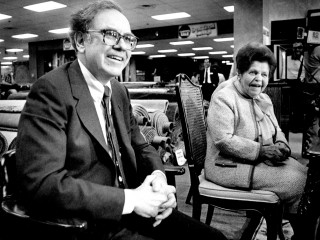

Warren Buffett with Rose Blumkin announcing the sale of a majority of the Nebraska Furniture Mart to Berkshire Hathaway in the early 1980’s.
Whether to sell a business or accept outside equity capital is a high stakes decision for business owners. Trade-offs are natural and necessary — we instinctively know that we cannot achieve every objective in every decision. It is pretty easy to categorize the business buyers into three categories:
Business Buyer Types
- Strategic Buyers (or competitors of some sort). They are buying your company for “strategic” reasons, or to morph your company into theirs.
- Financial Buyers. Traditional private equity will need to force a disruptive sale again in 3-5 years. If a smaller company is looking to sell equity to finance growth, they often think of traditional venture capital which will also require a disruptive exit in 3-5 years
- Other — Berkshire Hathaway and, I like to think, Greybull Stewardship. Warren Buffett has done a masterful job of crafting Berkshire Hathaway to be a preferred home for business that don’t want option #1 or option #2. Similarly, I have attempted to construct Greybull Stewardship to be a different type of buyer or investor that allows a company to continue its unique strategy and have more flexibility.
Warren Buffett Letter Describing Business Buyers
In the early 1980s, Warren Buffett wrote the letter below to the Blumkin family of the Nebraska Furniture Mart. He displays his skill at presenting the options and using language to convey ideas in an engaging manner.
If “you decide not to sell now, you are very likely to realize more money later on. With that knowledge, you can deal from strength and take the time required to select the buyer you want.”
They could sell to another furniture company or somebody in a similar business. But “such a buyer — no matter what promises are made — usually will have managers who feel they know how to run your business operations, and soon or later, will want to get into hands-on activity . . . They will have their own way of doing things and, even though your business record undoubtedly will be far better than theirs, human nature at some point will cause them to believe that their methods are superior.” [Note from Mason: I also think that many financial buyers feel that they can operate a business better than the managers with a track record, and too often such financial managers get overly involved.]
Then there is “the financial maneuverer, usually operating on large amounts of borrowed money, who plans to resell either to the public or to another corporation as soon as the time is favorable. If the sole motive of the owners is to cash their chips and put the business behind them, either of these types of buyers is satisfactory . . . But if the sellers’ business represents the creative work of a lifetime and remains an integral part of their personality and sense of being, both of these types of buyers have serious flaws.”
“Any buyer will tell you that he needs you and, if he has any brains, he most certainly does need you. But a great many, for the reasons mentioned above, don’t subsequently behave in that manner. We will behave exactly as promised, both because we have so promised, and because we need to.” [Note from Mason: Buffett is saying that he cannot operate the business because he doesn’t have any manager types at his headquarters and couldn’t manage it himself.]
The letter was quoted in the book Snowball by Alice Schroeder.
Related Links:
- Built to Last or Built to Flip? [masonmyers.com – June 19th, 2013]
- Investment Strategy & Structure is the #1 Thing Founders and CEO’s Should Watch in Raising Capital [masonmyers.com – March 24th, 2013]
- Family Business Role Models: Blumkin Family of Berkshire Hathaway [masonmyers.com – March 4th, 2013]
- BCG Study: Superior Investment Returns From Family Business [masonmyers – February 20th, 2013]
- Founder & VC Misalignment More Often Than Thought [masonmyers.com – January 10th, 2013]



 I am an investor at Greybull Stewardship, an
I am an investor at Greybull Stewardship, an 
 Sign Up
Sign Up RSS Feed
RSS Feed
By Raising Capital - Old School Myths When Raising Business Funding October 15, 2013 - 10:49 am
[…] these blog posts: VC Bargain: capital in exchange for the ‘duty’ to sell your company; Flippers and holders; Strategy and Structure; You are what you eat (or where you get your investment); Enlightenment […]
By Ideal business financing for growing, profitable companies in 100 posts or less? - Mason Myers Blog January 12, 2014 - 7:57 pm
[…] a business. Will long-term regrets stay with you longer than short-term gains? Do you sell to competitors, flippers or long-term capital? When and where do you raise capital or business financing? Particularly in a sale, bad […]
By Berkshire Hathaway Annual Meeting Notes for 2014 - Mason Myers Blog May 5, 2014 - 4:17 pm
[…] Berkshire Buyers According to Buffett: Competitors, Flippers, or Berkshire Hathaway […]
By Warren Buffett's Strategy, Selling Your Business, and Other Topics in Podcast Interview - Mason Myers Blog September 28, 2014 - 10:34 am
[…] Buffett’s strategy of being a different type of buyer than a strategic (meaning “competitor”), or a […]
By 9 Lessons Learned About Selling A Business | Business Advice October 3, 2014 - 2:23 pm
[…] Business Buyers According to Warren Buffett: Competitors, Flippers, and Berkshire Hathaway […]